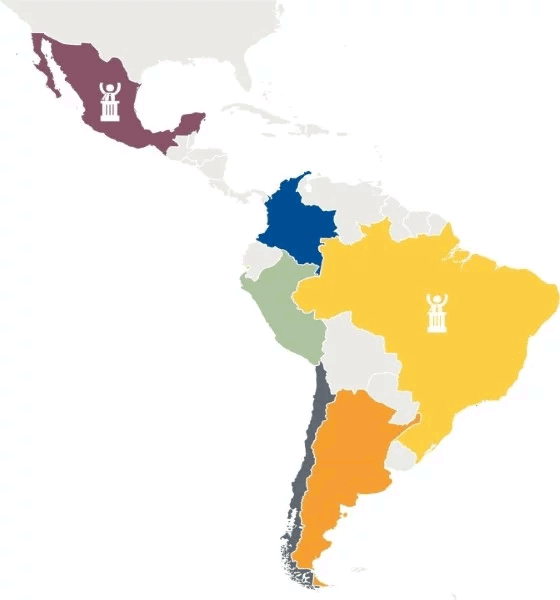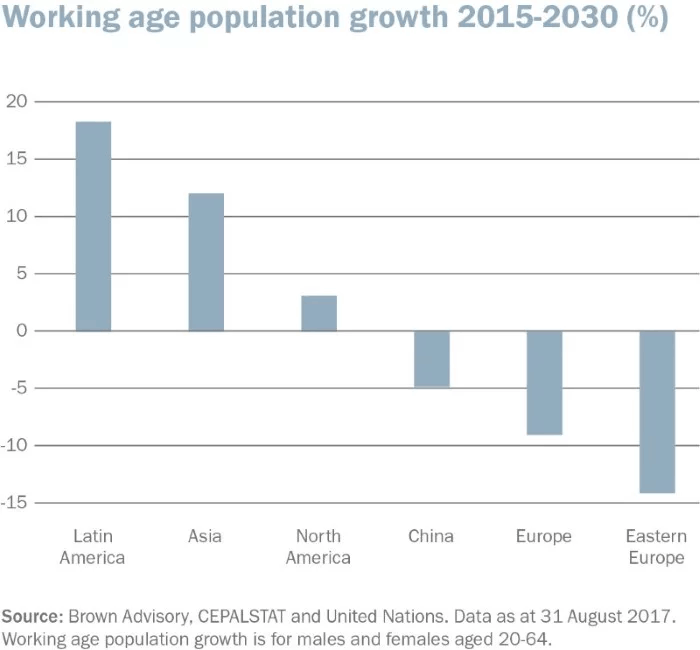Could Latin America be a great investment opportunity in 2019?
SPONSORED CONTENT - While there are challenges to overcome, we believe the investment outlook for Latin America as a whole is quietly encouraging, making it one of our key investment themes in 2019.

Latin America is generally viewed as comprising twenty independent sovereign states, stretching from Mexico to Cape Horn. As well as the countries shown in the infographic below, it includes Panama, Venezuela, Costa Rica, Guatemala and ten more nations.

While there are challenges to overcome, we believe the investment outlook for Latin America as a whole is quietly encouraging, making it one of our key investment themes in 2019.
In the 1980s, the region was characterised by hyper-inflation, dictatorships and state-ownership of assets, but today the principles of democracy and economic liberalisation are more in evidence. The macro-economic picture for much of Latin America is currently supportive, but there are also long-term tailwinds which suggest the region could outpace its developed market rivals in the years ahead.
MoneyWeek
Subscribe to MoneyWeek today and get your first six magazine issues absolutely FREE

Sign up to Money Morning
Don't miss the latest investment and personal finances news, market analysis, plus money-saving tips with our free twice-daily newsletter
Don't miss the latest investment and personal finances news, market analysis, plus money-saving tips with our free twice-daily newsletter
A demographic profile to enhance future investment opportunities
Latin America has an excellent demographic profile compared to much of the developed world. Its working age population is forecast to grow by 18% between 2015 and 2030 and, together with significant growth in the middle class, this will translate positively for many domestic industries.

Investment-wise, Brazil and Mexico dominate the region, representing over 84% of the MSCI Latin America Index as at October 2018. However, Argentina, Chile, Peru and Colombia also have relatively substantial financial markets. Together, the economies of these six nations represent 477 million people, with a combined GDP of nearly US$5trn. Economically, this is on a par with Japan.
Investor opportunities in Brazil and Mexico
Argentina's many problems have been well documented, but it is far from representative of the region.
Both Brazil and Mexico will start 2019 with relatively new presidents. They are at polar opposites of the political spectrum, but each is a populist whose election may not be the calamity that some initially feared. While Brazil's Jair Bolsonaro has been likened to Donald Trump, given his penchant for hyperbole, he could be the right man to deliver much-needed economic reform and liberalisation.
Recovery is on the way
The banking systems of both these economies have relatively few bad debts and, although both Brazil and Mexico have suffered from an extended period of weak domestic demand, recoveries are now under way.
- Mexico's participation in the United States-Mexico-Canada Agreement (USMCA) the trade deal which replaced NAFTA should not be underestimated, as it allows Mexico continued access to a booming US economy
- Meanwhile, China is already Brazil's largest trading partner and the US/China trade tensions have been a boon for Brazil's farmers; the price of Brazilian soybeans has appreciated by over 30% in 2018.
One of the biggest issues for both Brazil and Mexico is the fact they have been running budget deficits on a near permanent basis, although they are hardly alone. In a global context, their public debt as a percentage of GDP is not extreme. Both economies have also comfortably financed their current account deficits through long-term sources, rather than relying on the vagaries of short-term funding.
Making the most of investment opportunities in 2019
If, as we believe, the investment environment is supportive for equity markets in 2019, we may seek to introduce an exposure within portfolios if an opportunity presents itself.
• For more of our investment ideas for 2019, visit our website.
Investment involves risk. The value of investments and the income from them can go down as well as up and you may not get back the amount originally invested. Past performance is not a reliable indicator of future performance.
The information provided is not to be treated as specific advice. It has no regard for the specific investment objectives, financial situation or needs of any specific person or entity.
The information contained herein is based on materials and sources that we believe to be reliable, however, Canaccord Genuity Wealth Management makes no representation or warranty, either expressed or implied, in relation to the accuracy, completeness or reliability of the information contained herein. All opinions and estimates included in this document are subject to change without notice and Canaccord Genuity Wealth Management is under no obligation to update the information contained herein.
Justin Oliver
Deputy CIO
Justin provides direct assistance to the Chief Investment Officer in maintaining responsibility for the investment philosophy, process and methodology of Canaccord Genuity Wealth Management, and acts as the alternate to the CIO. He is Chairman of Canaccord Genuity Wealth Management's Portfolio Construction Committee, a member of the Asset Allocation and Fund Selection committees and manages several of Canaccord Genuity Wealth Management's Select range of funds. Justin is a Chartered Fellow of the CISI and is a former President of the Guernsey Branch of the Institute.
+44 207 523 4963
Get the latest financial news, insights and expert analysis from our award-winning MoneyWeek team, to help you understand what really matters when it comes to your finances.
MoneyWeek is written by a team of experienced and award-winning journalists, plus expert columnists. As well as daily digital news and features, MoneyWeek also publishes a weekly magazine, covering investing and personal finance. From share tips, pensions, gold to practical investment tips - we provide a round-up to help you make money and keep it.
-
 Should you buy an active ETF?
Should you buy an active ETF?ETFs are often mischaracterised as passive products, but they can be a convenient way to add active management to your portfolio
-
 Power up your pension before 5 April – easy ways to save before the tax year end
Power up your pension before 5 April – easy ways to save before the tax year endWith the end of the tax year looming, pension savers currently have a window to review and maximise what’s going into their retirement funds – we look at how

